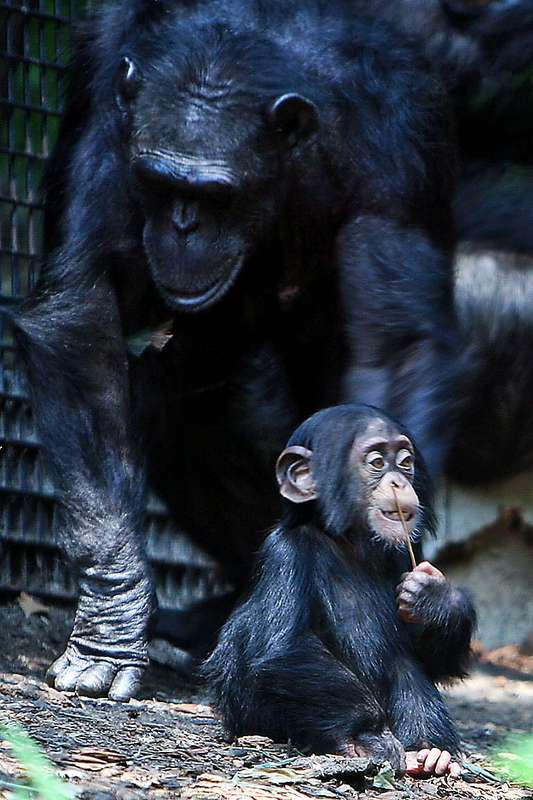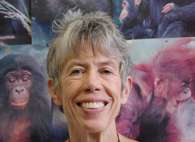Chimp Eggs Die Off Later than Humans Eggs—Even Though Humans Live Longer
 The oocytes (eggs) of chimpanzees degrade at a slower rate than the oocytes of women, even though chimps do not live as long.
The oocytes (eggs) of chimpanzees degrade at a slower rate than the oocytes of women, even though chimps do not live as long.
Indeed, many chimpanzees can get pregnant while in the thralls of geriatric diseases, unlike women, according to a recent Age study by Kristen Hawkes.
This new information offers more fuel for a theory called the Grandmother Hypothesis, which holds that women undergo menopause for an adaptive evolutionary reason, not just because humans are living longer and the ovaries haven’t caught up.
“In the other living hominids, the great apes, both cycling physiology and everything else senesce together,” Hawkes told Bioscience Technology. “As those things separate in our lineage, there have to be consequences for the interaction between the ovaries and physiology in general.” As Hawkes' group noted in the recent paper, anthropologists “should have expected something tricky here. The ovaries are not ever operating on their own. The HPO (hypothalamic pituitary gonadal) axis—where there are key interactions between the ovaries and brain—has to behave differently in the perimenopausal years in us vs chimpanzees.”
The grandmother hypothesis
Weill Cornell Medical College reproductive medicine researcher Roger Gosden has noted that a woman’s reproductive system ages faster than her other organs to the point where, by age 45, it is essentially 80 years old. The vast majority of animals do not experience any menopause, let alone the length experienced by women.
Famed State University of New York, Stony Brook, biologist G.C. Williams was first to propose that this long menopause might be an adaptation. He posited that it may have turned out to be an evolutionary advantage for older, frailer women to stop dividing their declining energies between nurturing existing children and preparing for new ones, and simply focusing on the children they had.
Since women’s dependent and in-utero children often die when they do, older mothers would stop risking their lives, and those of their children, if they stopped being fertile early on, avoiding risky older childbirths.
Hawkes has expanded greatly on the theory, suggesting that grandmothers became critical for survival when humans switched to a more difficult tuber diet (requiring vigorous female foraging and digging) during the Pleistocene climate change 1.8 million years ago. Grandmotherly tuber-digging shifts let mothers have many children, and focus on nurturing not food-gathering. Furthermore, Hawkes believes all this may have contributed to our bigger brains, as larger families meant more competition for mothers’ and grandmothers’ attention. So more communication ensued.
In 2007, Hawkes’ crew found that a small group of 19 chimpanzees died younger than modern women by some 40 years—yet their oocytes decayed at the same rate. This implied, among other things, that humans’ menopause may share some qualities with that of other primates.
Chimps and humans: different after all
But in their recent study, her crew examined a much larger group of chimps—three times larger—and found differences. “Analyses show depletion rates similar until about age 35,” the Hawkes team reported, “but after 35, the human counts continue to fall with age, while the change is much less steep in chimpanzees. This difference implicates likely effects on ovarian dynamics from other physiological systems that are senescing at different rates, and, potentially, different perimenopausal experience for chimpanzees and humans.”
 Commented Hawkes to Bioscience Technology: "The grandmother hypothesis proposes that somatic aging slowed in our lineage, while oldest parturitions remained conserved at ancestral ‘great-ape’ ages. The mechanisms—the physiological particulars that increased somatic maintenance favored by those grandmother effects have to be very complex. We’ve gone after a couple likely possibilities, adrenal androgen levels and leucocyte telomeres, and learned interesting, and initially surprising, things from those comparisons.”
Commented Hawkes to Bioscience Technology: "The grandmother hypothesis proposes that somatic aging slowed in our lineage, while oldest parturitions remained conserved at ancestral ‘great-ape’ ages. The mechanisms—the physiological particulars that increased somatic maintenance favored by those grandmother effects have to be very complex. We’ve gone after a couple likely possibilities, adrenal androgen levels and leucocyte telomeres, and learned interesting, and initially surprising, things from those comparisons.”
Continued Hawkes, “In evolutionary modeling we simplify all that into ‘longevity genes.’ So in the modeling, we start at a great ape-like longevity, establishing an equilibrium with longevity mutating—in all directions—and staying at approximate great ape levels. Then we add helpful grandmothering to see whether (very weak) grandmother effects are enough to increase longevities in model populations. The end of female fertility is not changing in the published simulations, something we assume based on the observed similarity in oldest births in humans and great apes (all in the forties and not beyond).”
In the simulations done, “only a tiny fraction of agents initially survive to be ‘eligible’ to grandmother. But that’s enough to do it. Results we’ve published show model populations moving from a great ape-like life history, to a human-like one, just as proposed in the verbal model.” All these are “continuing reasons to think this hypothesis is very much worth betting on.”
But what’s going on in the actual physiology? “As longevity increases, females are initially less likely to die while still cycling and postmenopausal survival increases,” Hawkes told Bioscience Technology. “Some of somatic physiology is pulling apart from what’s happening with cycling.”
As noted, she said, in other living hominids, reproductive cycling, and the rest of the body’s mechanics, decline together. As the human difference in reproductive cycling became apparent over evolution, humans clearly had to ensure consequences for the differing interaction between the ovaries and the rest of the body. Hawkes’ recent paper indicates that the entire HPO axis, involving most key interactions between ovaries and brain, may be involved in the rapid oocyte depletion—and substantial menopause—experienced by humans.
But ultimately, Hawkes told Bioscience Technology: “We need to know a lot more about how that’s working in chimpanzees to identify what selection might have done to those mechanisms in the evolution of greater longevity in our own lineage.”

